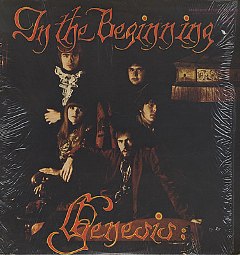Genesis - In The Beginning 1968
Genesis - In The Beginning 1968

1.Angeline 2:54
2.Suzanne 3:00
3.Gloomy Sunday 4:07
4.What It's All About 2:47 play
5.Mary, Mary 2:41 play
6.Ten Second Song 2:59
7.Girl Who Never Was 4:01
8.World Without You 16:08
Amerykański zespół Genesis nagrał jedną płytę. Chociaż nigdy nawet nie liznął sławy, która była udziałem jego angielskiego imiennika, to pozostawił osiem ciekawych piosenek na albumie In The Beginning z 1968 roku. Muzyka zespołu to typowe brzmienie „West Coast”, stylistycznie bardzo bliskie Jefferson Airplane czy Quicksilver Messenger Service - mieszanka ostrych, rockowych gitar, hipisowskich melodii i folkowych brzmień.
Duch Jefferson Airplane unosi się niemal nad całym albumem głównie za sprawą śpiewającej Sue Richman. Wystarczy posłuchać balladowego Suzane albo zaśpiewanego na kilka głosów Mary Mary. Czadowo robi się na początku albumu w utworze Angeline, gdzie riff do złudzenia przypomina legendarne Foxy Lady czy w świetnym, dynamicznym Ten Second Song. Mocniejsze utwory (głównie ze względu na brzmienie gitary solowej) przypominają z kolei dokonania Quicksilver Messenger Service (What's It All About). Na płycie jest też miejsce na folk - w utworze Gloomy Sunday muzycy zabierają nas w bajkowy, hippisowski świat z dawnych lat. Nieco mistycznie i tajemniczo robi się także w akustycznym, przejmującym Girl Who Never Was. Album kończy monumentalny World Without You z misterną, świetną solówką gitarową Jacka Ttanna. --- psychosonda.blogspot.com
In the beginning (if you start counting at around 1968), there were two bands named Genesis. The more famous of the acts to bear the Genesis moniker is, of course, the British art-rock group that eventually morphed into a watered down Top 40 sensation. For those of us way too young to have experienced English prog at its inception, we first experienced this Genesis as a hallmark of lukewarm adult contemporary lameness. Little did we know that the same Phil Collins who crooned "Invisible Touch" from the speakers of mini-vans throughout the suburbs had all sorts of artistic cred. Learning of Genesis' Peter Gabriel-fronted incarnation – the one featuring costumes, weird time changes, and a superlatively bearded, Eno-collaborating Phil Collins behind the drum kit – was a seminal experience for plenty of serious music fans who came of age in the late '80s. "What's next?" we asked, "I suppose you're going to tell me that Steve Winwood used to be cool, too?"
Given the cultural ubiquity of Genesis (UK), it's interesting to find that there's a completely unrelated Genesis that sprang forth in the States from the same time period. With the Collins-fronted Genesis having recently reunited and started touring, it seems like an all-too-perfect time for a CD re-release of the other, LA-based Genesis' only album. That's not to say that the label, Fallout, should expect the same kind of accidental spillover business DVD retailers look for when they stock shelves with repackaged, busted-ass old Lord of the Rings cartoons to coincide with the theatrical release of one of the films. But as Genesis (UK) makes a return to the public consciousness, it definitely increases the appeal of In The Beginning as a curiosity piece. This is especially true because, due to an apparent dearth of imagination for biblical puns, the first album by Genesis (UK), originally titled From Genesis to Revelation, has over the years been re-released under the title (you guessed it) In The Beginning.
In The Beginning is a decent enough acid rock album very clearly born from LA in the late '60s. Much more fascinating than the music on the album is the list of acts in which members of Genesis had previously performed. In The Beginning comes at the end of a garage-psych tradition, but is entirely in keeping with the latter-day sound of the '60s. The album doesn't quite hold up as well as some of its more raw and aggro antecedents.
In The Beginning is an unearthed gem, but it's an unearthed gem of baroque classic rock, subject to some of the trappings that era. Genesis doesn't quite live up to some of its more idiosyncratic contemporaries (the blaring Blue Cheer, the jazz and pop tinged Spirit,) nor does it touch the mind-boggling moddish psych of its forbears Sons of Adam. That said, there's something to the pretty female leads (especially on the cover of original suicide rock anthem "Gloomy Sunday”) and dueling vocals in the context of the music. Not to mention, it's hard to deny the twinge of entertainment derived from the band having such a prominent nominative doppelganger. Imagine the smug satisfaction you’ll feel as someone poses you the question, "Oh, you mean Peter Gabriel-era Genesis?" and you respond, "No, I mean the Genesis from LA, the one you've never heard of." --- Matthew A. Stern








